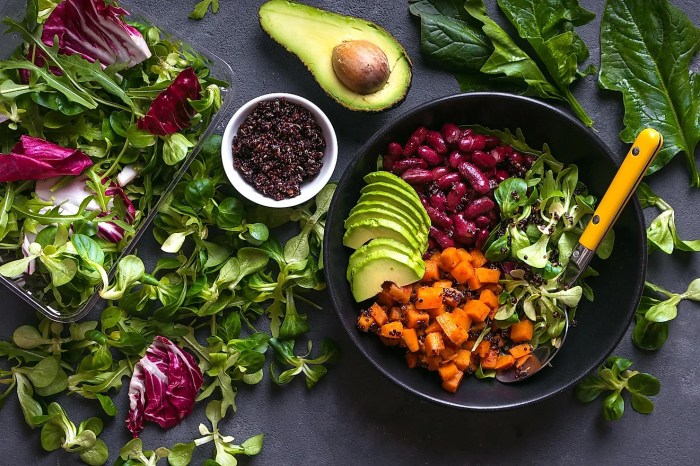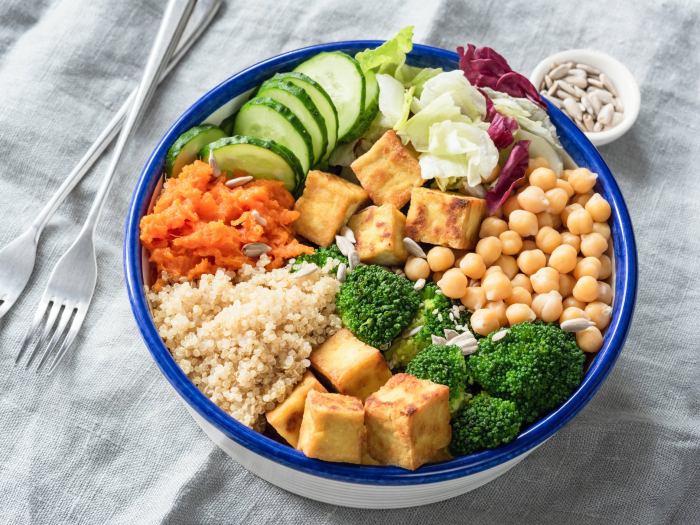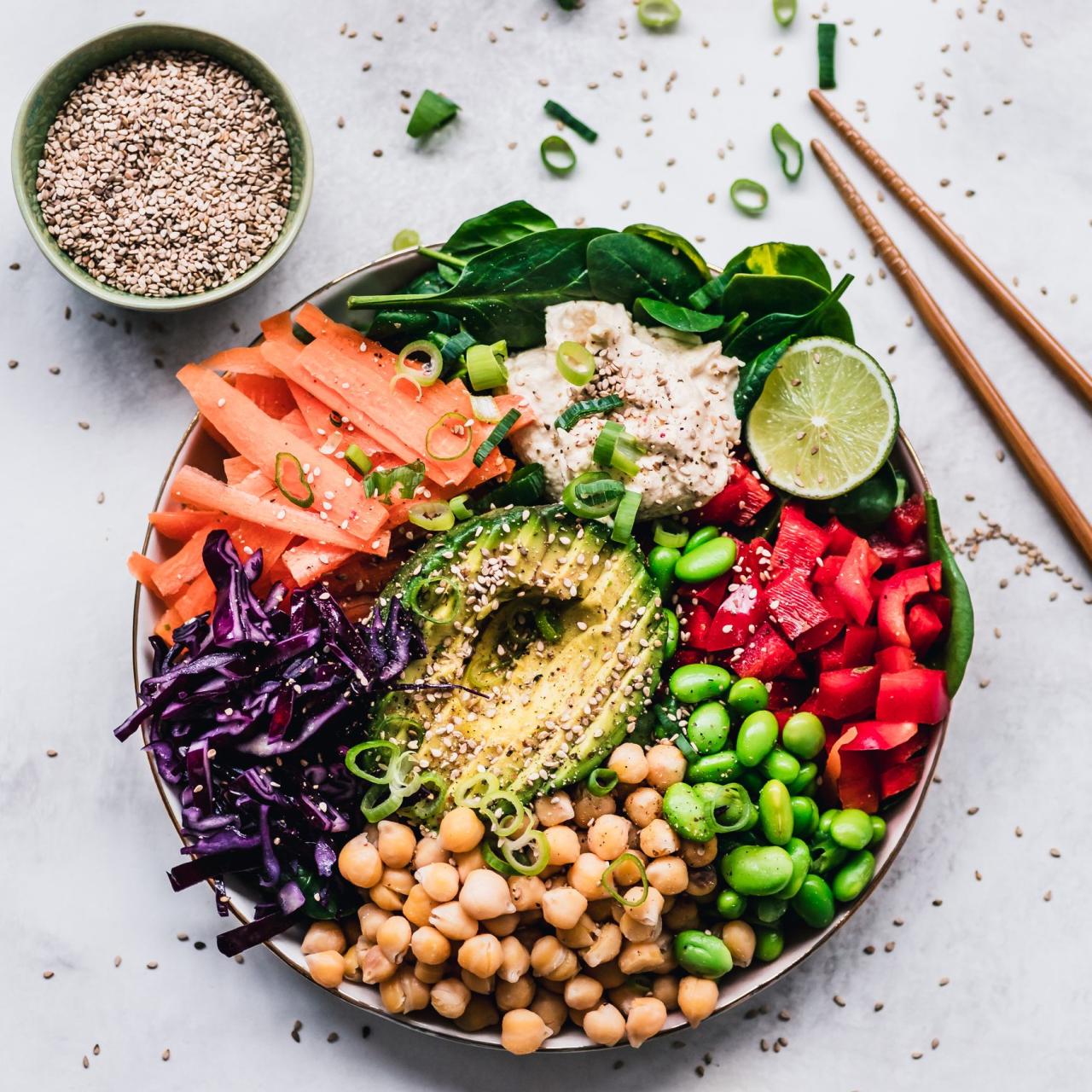How to diet as a vegetarian – Embarking on a vegetarian diet requires careful planning to ensure adequate nutrient intake. This comprehensive guide explores the dietary guidelines, meal planning strategies, health benefits, and challenges associated with a plant-based lifestyle, empowering you to make informed choices and thrive as a vegetarian.
Dietary Guidelines for Vegetarians: How To Diet As A Vegetarian
Vegetarianism is a diet that excludes meat, poultry, fish, and seafood. There are many reasons why people choose to adopt a vegetarian diet, including ethical concerns about animal welfare, environmental sustainability, and health benefits.
A well-planned vegetarian diet can be healthy and nutritious. However, it is important to be aware of the specific nutritional needs of vegetarians and to take steps to ensure that you are getting all the nutrients you need.
Variety and Balance
One of the most important principles of a vegetarian diet is to eat a variety of plant-based foods. This will help you to ensure that you are getting all the nutrients you need.
Some of the key food groups to include in a vegetarian diet are:
- Fruits
- Vegetables
- Whole grains
- Legumes
- Nuts and seeds
In addition to eating a variety of plant-based foods, it is also important to eat a balanced diet. This means eating the right amount of calories and nutrients for your individual needs.
Specific Nutritional Considerations
There are a few specific nutrients that vegetarians need to be especially mindful of:
- Protein:Protein is essential for building and repairing tissues. Good sources of protein for vegetarians include legumes, tofu, tempeh, nuts, and seeds.
- Iron:Iron is essential for carrying oxygen throughout the body. Good sources of iron for vegetarians include fortified cereals, beans, lentils, and dark leafy greens.
- Calcium:Calcium is essential for building and maintaining strong bones. Good sources of calcium for vegetarians include fortified plant milks, yogurt, and leafy green vegetables.
- Vitamin B12:Vitamin B12 is essential for the production of red blood cells. Vitamin B12 is not naturally found in plant foods, so vegetarians need to eat fortified foods or take a supplement.
Meal Planning for Vegetarians
Meal planning is crucial for vegetarians to ensure they consume a balanced and nutritious diet. A well-structured meal plan can help meet recommended nutrient guidelines and promote overall health and well-being.
Here’s a sample meal plan that provides a variety of food groups and nutrient-rich options:
Breakfast
- Oatmeal with berries, nuts, and seeds (provides fiber, antioxidants, and protein)
- Tofu scramble with vegetables (provides protein, iron, and calcium)
- Whole-wheat toast with avocado and hummus (provides carbohydrates, healthy fats, and fiber)
Lunch
- Lentil soup with whole-wheat bread (provides protein, fiber, and iron)
- Salad with grilled tofu, quinoa, and vegetables (provides protein, carbohydrates, and vitamins)
- Bean burrito with brown rice and salsa (provides protein, fiber, and carbohydrates)
Dinner
- Stir-fry with tofu, vegetables, and brown rice (provides protein, vegetables, and carbohydrates)
- Lentil shepherd’s pie with mashed potatoes (provides protein, fiber, and carbohydrates)
- Vegetable curry with whole-wheat roti (provides protein, vegetables, and carbohydrates)
Snacks
- Fruit (provides vitamins, minerals, and antioxidants)
- Nuts and seeds (provides healthy fats, protein, and fiber)
- Yogurt (provides protein, calcium, and probiotics)
Meal Prepping Tips
- Cook in bulk and freeze leftovers for quick and easy meals.
- Chop vegetables and fruits in advance to save time during meal prep.
- Use slow cookers or pressure cookers to prepare meals ahead of time.
- Consider meal delivery services that offer vegetarian options.
Convenient Vegetarian Meals
- Smoothies: Blend fruits, vegetables, and plant-based milk for a quick and nutritious breakfast or snack.
- Sandwiches: Layer vegetables, tofu, or tempeh on whole-wheat bread for a portable and filling meal.
- Salads: Combine mixed greens, vegetables, beans, and grains for a refreshing and nutrient-packed lunch or dinner.
Health Benefits of a Vegetarian Diet

Adopting a vegetarian diet offers a myriad of health advantages, ranging from a reduced risk of chronic diseases to improved overall well-being. Research has consistently demonstrated that plant-based diets are associated with a lower incidence of heart disease, certain types of cancer, and obesity.
Vegetarian diets are rich in antioxidants, fiber, and phytochemicals, which play crucial roles in promoting optimal health. Antioxidants protect cells from damage caused by free radicals, while fiber aids in digestion, promotes satiety, and regulates blood sugar levels. Phytochemicals, on the other hand, are plant compounds with disease-fighting properties.
Vegetarians abstain from consuming animal products, including meat, poultry, and dairy. But what about seafood? The answer to the question of can vegetarians eat seafood is not as straightforward as one might think. While some vegetarians choose to include fish and other seafood in their diets, others believe that all animal products should be avoided.
Cardiovascular Health
Vegetarian diets have been linked to a reduced risk of heart disease. Plant-based foods are typically low in saturated fat and cholesterol, which contribute to the buildup of plaque in arteries. Additionally, the high fiber content in vegetarian diets helps lower blood pressure and improve cholesterol levels.
- A study published in the “American Journal of Clinical Nutrition” found that vegetarians had a 24% lower risk of heart disease compared to non-vegetarians.
- Another study, published in the “Journal of the American Medical Association,” reported that vegans had a 15% lower risk of heart disease than meat-eaters.
Cancer Prevention
Certain types of cancer, such as colon and prostate cancer, have been associated with a lower risk in vegetarians. Plant-based foods contain high levels of antioxidants and fiber, which have been shown to protect against DNA damage and inhibit cancer cell growth.
- A study published in the “International Journal of Cancer” found that vegetarians had a 20% lower risk of colon cancer compared to non-vegetarians.
- Another study, published in the “Journal of the National Cancer Institute,” reported that vegans had a 34% lower risk of prostate cancer than meat-eaters.
Weight Management
Vegetarian diets are often lower in calories and fat than non-vegetarian diets. The high fiber content in plant-based foods promotes satiety and helps control appetite. Additionally, vegetarian diets are typically rich in fruits and vegetables, which are low in calories and high in nutrients.
- A study published in the “Journal of the American Dietetic Association” found that vegetarians had a lower body mass index (BMI) than non-vegetarians.
- Another study, published in the “American Journal of Public Health,” reported that vegans had a 15% lower risk of obesity than meat-eaters.
Challenges and Solutions for Vegetarian Diets

Adopting a vegetarian diet can bring numerous benefits, but it also presents certain challenges. Understanding these challenges and developing effective solutions can help vegetarians maintain a healthy and fulfilling diet.
Social Situations
Vegetarianism may pose challenges in social situations where food choices are often limited. Here are some strategies to navigate these scenarios:
- Communicate preferences:Inform hosts or friends about your dietary restrictions in advance to ensure suitable options are available.
- Be prepared:Bring your own snacks or meals to social events where vegetarian options may be scarce.
- Suggest alternatives:Politely suggest vegetarian-friendly dishes or ask for modifications to existing dishes.
Dining Out
Finding vegetarian options while dining out can be challenging. Here are some tips to make it easier:
- Research restaurants:Check online reviews or call ahead to inquire about vegetarian options.
- Explore ethnic cuisines:Many ethnic cuisines, such as Indian, Thai, and Mediterranean, offer a wide range of vegetarian dishes.
- Ask for modifications:Request substitutions or modifications to non-vegetarian dishes to create vegetarian options.
Travel
Traveling can present unique challenges for vegetarians. Here are some strategies to ensure a smooth experience:
- Pack vegetarian snacks:Bring non-perishable vegetarian snacks to avoid relying solely on available food options.
- Research local cuisine:Learn about the local cuisine and identify vegetarian-friendly restaurants before traveling.
- Communicate with locals:Ask locals for recommendations or use translation apps to communicate your dietary restrictions.
Importance of Planning, Communication, and Resourcefulness
Overcoming the challenges of a vegetarian diet requires planning, communication, and resourcefulness. By planning meals in advance, communicating dietary needs effectively, and exploring various resources, vegetarians can maintain a healthy and fulfilling diet while navigating social situations, dining out, and traveling.
Resources for Vegetarians
Embracing a vegetarian lifestyle can be enriching, but it also requires careful planning and guidance to ensure optimal nutrition. Various resources are available to support vegetarians in their dietary journey, providing valuable information and assistance.
Consulting with a healthcare professional or registered dietitian specializing in vegetarian diets is highly recommended. They can provide personalized guidance, address specific nutritional concerns, and help develop a tailored meal plan that meets individual needs and preferences.
Vegetarianism has gained immense popularity in recent years, with many individuals opting for a plant-based diet. However, one common question that arises is whether vegetarians can eat seafood. While some vegetarians choose to include fish and other aquatic animals in their diet, others adhere to a stricter plant-based regimen that excludes all animal products.
Cookbooks
- The Vegetarian Bibleby Rose Elliot
- The Complete Vegetarian Cookbookby America’s Test Kitchen
- Isa Does Itby Isa Chandra Moskowitz
- The Happy Herbivore Cookbookby Lindsay S. Nixon
Websites
- The Vegetarian Resource Group: https://www.vrg.org/
- North American Vegetarian Society: https://www.navs-online.org/
- American Dietetic Association: https://www.eatright.org/
Support Groups, How to diet as a vegetarian
- Local vegetarian meetup groups
- Online forums and social media groups
- Support groups for specific dietary needs (e.g., vegan, gluten-free)
Registered Dietitians
Registered dietitians (RDs) are qualified healthcare professionals who can provide expert advice on vegetarian diets. They can help develop personalized meal plans, address nutritional deficiencies, and provide ongoing support and guidance.
Vegetarian Certification Programs and Labels
- American Vegetarian Association (AVA): https://www.vegetariantimes.com/
- Vegan Action: https://www.vegan.org/
- The Vegetarian Society (UK): https://www.vegsoc.org/
These certifications and labels help consumers identify vegetarian and vegan products, ensuring they align with their dietary preferences.
Ending Remarks

Adopting a vegetarian diet offers numerous health benefits and can be a sustainable and ethical choice. By understanding the nutritional considerations, meal planning principles, and resources available, you can navigate the challenges and reap the rewards of a plant-based lifestyle.
FAQ Guide
Is it difficult to get enough protein on a vegetarian diet?
No, with careful planning, vegetarians can easily meet their protein needs through plant-based sources such as beans, lentils, tofu, and quinoa.
What are the best sources of iron for vegetarians?
Good sources of iron for vegetarians include fortified cereals, beans, lentils, and leafy green vegetables. Vitamin C can enhance iron absorption, so consider pairing these foods with citrus fruits or juices.
How can vegetarians ensure adequate calcium intake?
Dairy alternatives such as fortified plant-based milk, yogurt, and cheese can provide calcium. Additionally, leafy green vegetables, almonds, and fortified juices are good sources.
Is vitamin B12 deficiency a concern for vegetarians?
Yes, vitamin B12 is primarily found in animal products. Vegetarians should consider fortified foods, supplements, or nutritional yeast to meet their daily requirements.